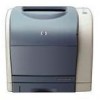HP 2500 HP PCL/PJL reference - Printer Job Language Technical Reference Manual - Page 35
What's Next?, Using PJL 3-5
 |
View all HP 2500 manuals
Add to My Manuals
Save this manual to your list of manuals |
Page 35 highlights
What's Next? Now that you have learned the PJL requirements and have seen how to use PJL commands in the sample programs described on the previous page, look through the following "Command Groupings" table. It can help you find the information you need to add PJL capabilities to your application. If your application only uses PJL to switch printer languages, you may need to read only Chapter 4. However, if you want to do more with PJL, be sure to look through Chapter 11 (Programming Tips for Using PJL), and the other chapters that pertain to your application. Also, be sure you know which PJL commands are supported by the printer you are using. See Appendix A for feature support information. • Chapter 5 explains commands that enable you to create jobs for keeping track of printing status, and explain a non-printing mode that allows printing of specific pages of print jobs. • Chapter 6 describes commands that enable you to change control panel settings and default configuration settings. The commands in this chapter enable you to set the printer features to a known state. • Chapter 7 covers status readback commands, enabling you to request configuration and status information from the printer. • Chapter 8 explains the commands that can alter the messages displayed on the printer control panel. • Chapter 9 describes the PJL file system for managing printer-based file storage. • Chapter 10 describes using the PJL job management commands. EN Using PJL 3-5















